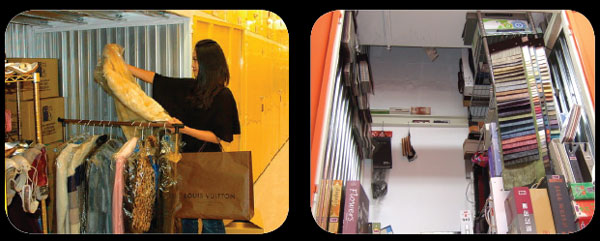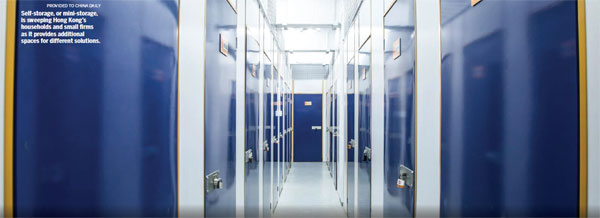The conquest of space
Updated: 2014-11-21 07:12
By Agnes Lu(HK Edition)
|
|||||||
|
Self-storage, or mini-storage, is sweeping Hong Kong's households and small firms as it provides additional spaces for different solutions. Provided to China Daily |
Fed up with clutter, and as average living space per person diminishes, more and more Hong Kong residents are looking to self-storage firms for solutions. Agnes Lu reports.
Five months ago, Henri's girlfriend decided to move in. As a lawyer working in Central, he was keeping all of his Hong Kong belongings in a small Sheung Wan flat of around 400 to 500 square feet. Now he had to find another place to store his golf gear, empty suitcases, old books and out-of-season clothes.
"I was walking near my apartment when I saw this storage company. For me, the priority was convenience. I basically chose the storage space that was closest to my apartment," Henri said.
The storage was just a minute's walk from where he lives. He chose a storage room of four feet by three feet, for HK$1,300 ($168) a month. He delivered to the company the stuff he would not need for a while and signed a monthly contract, letting him easily take back the items whenever he gets a bigger apartment. "It was a very simple decision," Henri said.
To avoid clutter, and with the average living space per person in Hong Kong diminishing, more and more residents are favoring Henri's solution. Old baby toys, family photo albums, piles of documents and seasonal clothes don't have to be crammed into cabinets or get scattered whenever the door is opened.
Simply carry them to the nearest storage company - or have someone come to pick them up - and enjoy living in a neat apartment. With your memories safely stored, a simple key lets you revisit those former days at will.
Within easy reach
Self-storage, or mini-storage, is sweeping Hong Kong's households and small firms. According to the Self Storage Association Asia (SSAA), at a rough count, there were more than 80 self-storage operators in Hong Kong in September this year, providing more than 500 units of storage space.
Providers are usually located in industrial buildings within easy reach of busy urban transport hubs, such as MTR stations and major bus stops.
"High residential areas as well. Usually these apartment buildings are very closed, so the amount of living space people have is very small," said Luigi La Tona, the SSAA's executive director.
The most popular self-storage rooms range in size from 30 to 50 sq ft. This concurs with data from Kevin She, owner of one of Hong Kong's top self-storage operators, SC Storage, whose advertisements can be seen everywhere from the MTR to truck billboards.
About 10 percent of the company's revenue has gone into marketing, she said. SC Storage now has more than 50 branches across the city in 20 different districts, catering to more than 17,000 customers. Revenue exceeded HK$100 million last year.
From the company's website, it's clear that SC Storage offers more than general storage for normal household purposes. Also gaining popularity among the middle class are wine storage, with thermal control, and bicycle storage.
Hong Kong Storage, another senior player in the industry, offers free moving assistance, allowing customers to put their stuff in storage without having to leave home.
Founder Bobby Chung said the company aims to increase its investment in automation, developing its mobile platform.
Both of these companies are equipped with 24-hour security and accessibility. Storage sizes range from 10 sq ft to more than 100 sq ft, with rentals starting at HK$595 per month.
At SC Storage, 65 percent of customers are household users, mainly middle-aged, married and middle class. Thirty percent are business users, and sometimes 8-9 percent are independent contractors seeking temporary storage for construction tools. Hong Kong Storage calculated that 70 percent of its customers are individual users. Its facilities are usually more than 90 percent full.
Self-storage in Hong Kong: A Growing Niche, a white paper released in August by Colliers International, estimated that about 820,000 households are living in homes without a storage room. If half of them demanded 30 sq ft of storage space each, the market size would be 12.3 million sq ft, compared to an estimated current supply of 2.8 million sq ft.
Potential bonanza
Both of these operators have been in the market for more than 10 years. However, self-storage services have become really popular only recently, suggesting this is still a potential bonanza.
"With Hong Kong people becoming more accustomed to using self-storage, plus the benefits of stable rental income and premium yields, it's a sector that looks set for significant growth," said Arthur Yim, manager of research and advisory services at Colliers International Hong Kong.
The popularity can be partly attributed to low prices for industrial space before 2010. Some operators like SC Storage set up their storage rooms on their own property, giving them full autonomy. Other business models include renting industrial space or cooperating with the landlords of those buildings.
But the land situation in Hong Kong is the critical factor. "In Hong Kong, it's always about the land. Because of the land scarcity, people find it so expensive to buy homes or rent a residential unit. In that case, people have to seek an alternative method to store their items, which otherwise just occupy their living space," said Chung at Hong Kong Storage.
The rise of self-storage is natural in a city where the middle class remains the dominant social force and where the population's mobility is so pervasive. But the industry is not immune to a future land crisis.
Statistics released in August by CBRE showed that the city's warehouse vacancy rate slid from 1.1 percent at the end of 2013 to 0.4 percent in June this year. Only four industrial sites were sold by the government in the past decade, versus 110 sites for residential development.
This points to an intense scramble for industrial space, especially in the urban areas, even as new market participants queue up to get a share. The short supply will inevitably cast a shadow on operators who do not have their own properties. Adding to their woes are rising labor costs.
"I think that whoever jumps into this industry to run a self-storage business will have to face the fact that they cannot provide cheaper and cheaper storage because of the land scarcity," said Chung. He said the supply of storage units would grow, but so would the rental fees charged, as land costs climb. Chung's company is now considering expanding on the city's outskirts.
She, of SC Storage, said he has heard of four self-storage companies closing down already this year. Some of them were too small to generate market awareness; another did not own the property and the landlord took it back.
Contact the writer at agnes@chinadailyhk.com


(HK Edition 11/21/2014 page9)
